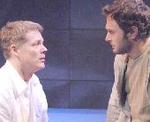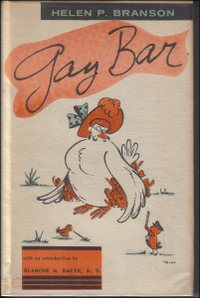When I was growing up I would have given anything to have had a relative who might have been, could have been…not discussed. That "funny uncle" whose name would immediately elicit a change of subject. I would have beat a path to his door and demanded answers, guidance…the protection only family can offer. Instead, as soon as I was able, I high-tailed it to the West Coast (I’d always had crushes on surfers) and San Francisco, under the pretense of accepting a "job opportunity." Somehow I managed to survive the early 70s in S.F.and find a semblance of "Gay identity" in the process without succumbing to drugs and the street. Many of us are not so lucky, and every time I see a news story about some young person’s suicide, my first supposition is "Gay."
 This, of course, is an oft-told tale. Escape from the middle west, the deep south, the constraints of whoever you are, wherever you grew up to a place where anonymity promises opportunity to define self. Gay self. This is the basis of a new play by playwright Dean Gray, Uncle, playing for a maddingly brief run at the ArcLight Theater on the Upper West Side in NYC. Gray’s name may be famliar to some readers as the playwright behind the adaptation of Will Fellows’ fine anthology of oral histories titled Farm Boys: Lives of Gay Men from the Rural Midwest. Fellows has gone on to write Passion to Preserve: Gay Men as Keepers of Culture. While Uncle is not another Fellows-based piece it is in the same vein…midwest roots.
This, of course, is an oft-told tale. Escape from the middle west, the deep south, the constraints of whoever you are, wherever you grew up to a place where anonymity promises opportunity to define self. Gay self. This is the basis of a new play by playwright Dean Gray, Uncle, playing for a maddingly brief run at the ArcLight Theater on the Upper West Side in NYC. Gray’s name may be famliar to some readers as the playwright behind the adaptation of Will Fellows’ fine anthology of oral histories titled Farm Boys: Lives of Gay Men from the Rural Midwest. Fellows has gone on to write Passion to Preserve: Gay Men as Keepers of Culture. While Uncle is not another Fellows-based piece it is in the same vein…midwest roots.
Uncle is fine piece of stage work by a talented playwright who readily admits to putting much of himself up there on the stage. The protagonist, Brent (played handsomely by Brian Patacca) is from rural Wisconsin. Now living in New York City, pursuing a composing career, his psyche is perilously on the edge…the first scenes, wordlessly show him alone, and suicidal despite having achieved what, by any standards in the NY music scene, would be considered "success." As Brent explains to his mother, Iris (played lovingly by actress Nancy McDoniel, most recently seen in the 9/11 film, United 93) he’s "tired of being alone."
 [L: James Heatherly and R: Brian Patacca – photo: Jim Baldassare]
[L: James Heatherly and R: Brian Patacca – photo: Jim Baldassare]
He’s not alone anymore, and hasn’t really been alone for some time. First, there’s the handsome and sweet Sean, (actor James Heatherly) working in the Lincoln Center Performing Arts Library, who is immediately smitten with Brent and drawn into his intensity. But Brent’s other constant companion is the ghost of his long dead Uncle Irvin (actor Darren Lougee) that uncle that no one spoke of, and when they did, someone changed the subject. Finding a snapshot of his Uncle Irvin (that, in this production, is actually of the playwright’s own family), on one more "good-son" journey home to Wisconsin, he questions his mother about the other man in the picture, the one wearing the matching sweater to Uncle Irvin’s. Mom plays dumb and changes the subject to cheese.
Surprisingly spare, the play is, in the end, moving and sweet without cloying. There are ghosts and flashbacks. There are moments in which Gray comes perilously close to "sending a message," and there are some close-to-soap-opera moments, but he dodges these (for me) cringe-inducing pitfalls with well-drawn, human characters…characters we’ve all known or been at one point or another in our lives as Gay people. My partner and I were crying at the end…and they were tears Gray earned honestly. And I hasten to add, they were not the tears of another Brokeback "dead queer" at the end of a morality tale, but tears of reconciliation and the power of love and family. Nor, I might add, is there gratuitous parading of half-dressed handsome men. For those of us for whom this is kind of exposure is important, or at least desirable, yes, shirts and pants are removed. But I’d have to say the sexiest moments are fully clothed and simply sealed with a kiss. Sometimes less really is more.
 Speaking with playwright Dean Gray, this morning, he tells me his next project is another adaptation of a book titled Gay Bar. He’s not really interested, he says, in being tagged as "a gay issues playwright," and I sympathize…but then again, you write what you know. He spoke of his aging parents, something we all come to terms with at some stage of life…but something that takes on even more weight in the lives of many gay men, either because we’re estranged from family or, as is more often the case, and less often acknowledged, the "good sons and daughters" who take on the burdens of aging parents when heterosexual siblings are otherwise engaged with their own children and their own families.
Speaking with playwright Dean Gray, this morning, he tells me his next project is another adaptation of a book titled Gay Bar. He’s not really interested, he says, in being tagged as "a gay issues playwright," and I sympathize…but then again, you write what you know. He spoke of his aging parents, something we all come to terms with at some stage of life…but something that takes on even more weight in the lives of many gay men, either because we’re estranged from family or, as is more often the case, and less often acknowledged, the "good sons and daughters" who take on the burdens of aging parents when heterosexual siblings are otherwise engaged with their own children and their own families.
All too often…and all too often at the hands of our own media…GLBT people are portrayed as care-free with plenty of surplus income for disposal on fashion and style and travel. Tra-fucking-lah!
I may have known one or two gay men like that in my life, but by and large most GLBT people I know are hard-working, just trying to get by and, at the same time, frequently the people who are most involved in taking care of family matters. I’m far from being a proponent of "we’re just like straight people, except for what we do in bed" but the fact of the matter is, this is sadly NOT the image we see of most GLBT people and it is the one I find most common in my own experience…family is important to us. In fact, family is probably THE critical consideration in most GLBT people’s lives when thinking about coming out. [Memo to Oprah…next time you sit there wide-eyed and clutching your fucking pearls, trying to find out why some Gay man would "lie" to people he loves, please remember that unlike Gay people, black folk were never in any danger of losing the love of family because of race. Neither is being African-American reviled as an abomination in the eyes of god. Nor is there the state-sanctioned pressure to become White. Please…you’ve got a joint checking account with god now, Oprah…buy a clue.]
Anyway, for my own part, as I prepared to come out, I finally had to reach the place where I had to prepare myself for the chance…even the probability I thought…that I might actually never see my family again once I came out. While that wasn’t the case, the strain and estrangement with my own family went on for decades. I don’t think this is unusual. Dean Gray has put it on stage in Uncle and it is well worth seeing. As this production will only be there for a short run, we can only urge readers to watch for more from Dean Gray. It’s a nice antidote to Queer Eye. Or at least some much-needed balance.